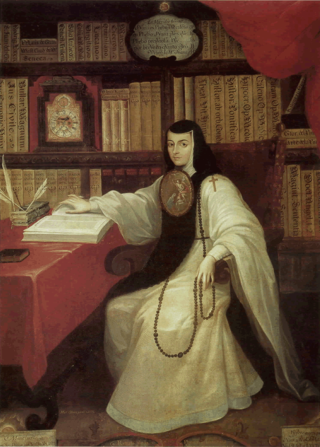This article needs additional citations for verification .(February 2013) |
| |||
|---|---|---|---|
| +... | |||
This article contains information about the literary events and publications of 1651.
This article needs additional citations for verification .(February 2013) |
| |||
|---|---|---|---|
| +... | |||
This article contains information about the literary events and publications of 1651.
This article contains information about the literary events and publications of 1700.
This article contains information about the literary events and publications of 1692.
This article contains information about the literary events and publications of 1691.
This article contains information about the literary events and publications of 1688.
This article contains information about the literary events and publications of 1680.
This article contains information about the literary events and publications of 1648.

Juana Inés de Asbaje y Ramírez de Santillana, better known as Sor Juana Inés de la Cruz, was a New Spain writer, philosopher, composer and poet of the Baroque period, as well as a Hieronymite nun, nicknamed "The Tenth Muse" and "The Phoenix of America" by her contemporary critics. As a Spanish-criolla from the New Spain, she was among the main American-born contributors to the Spanish Golden Age, alongside Juan Ruiz de Alarcón and Garcilaso de la Vega "el Inca", and is presently considered one of the most important female authors in Spanish language literature and the literature of Mexico.

The University of the Cloister of Sor Juana is a private university located in the former San Jerónimo Convent in the historic center of Mexico City. This convent is best known for having been the home of Sor Juana Inés de la Cruz for over twenty five years, she produced many of her writings here. After the convent was closed in the 19th century, the large complex was divided and was home to a number of institutions and businesses, including a large dance hall in the mid 20th century. In the 1970s, the government expropriated the complex, explored it and began the restoration process. In 1979, the current university was founded at this site and it is currently the benefactor and guardian of the complex. The institution offers bachelors, two masters and two certificates, mostly in the humanities. The institution also sponsors or co-sponsors a number of cultural and educational activities, mostly situated in the historic center of the city.
Latin American poetry is the poetry written by Latin American authors. Latin American poetry is often written in Spanish, but is also composed in Portuguese, Mapuche, Nahuatl, Quechua, Mazatec, Zapotec, Ladino, English, and Spanglish. The unification of Indigenous and imperial cultures produced a unique and extraordinary body of literature in this region. Later with the introduction of African slaves to the new world, African traditions greatly influenced Latin American poetry. Many great works of poetry were written in the colonial and pre-colonial time periods, but it was in the 1960s that the world began to notice the poetry of Latin America. Through the modernismo movement, and the international success of Latin American authors, poetry from this region became increasingly influential.

Don Carlos de Sigüenza y Góngora was one of the first great intellectuals born in the Americas - Spanish viceroyalty of New Spain. He was a criollo patriot, exalting New Spain over Old. A polymath and writer, he held many colonial government and academic positions. Sigüenza is considered the da Vinci mexicano.
Protofeminism is a concept that anticipates modern feminism in eras when the feminist concept as such was still unknown. This refers particularly to times before the 20th century, although the precise usage is disputed, as 18th-century feminism and 19th-century feminism are often subsumed into "feminism". The usefulness of the term protofeminist has been questioned by some modern scholars, as has the term postfeminist.
Margaret ("Petch") Sayers Peden was an American translator and professor emerita of Spanish at the University of Missouri. Prior to her death in 2020, Peden lived and worked in Columbia, Missouri.
The Sor Juana Inés de la Cruz Prize is a literary prize awarded to a book written in Spanish by a female author. It is organized by the Guadalajara International Book Fair, based in Guadalajara, Jalisco, Mexico. Current winners of the prize receive USD$10,000.
Nationality words link to articles with information on the nation's poetry or literature.

Guillermo Schmidhuber de la Mora is a Mexican author, playwright, and critic.
Margarita López Portillo y Pacheco (1914–2006) was a Mexican novelist who earned several awards for her novels and also had three of them adapted for film. She was a public servant, serving under three presidents in various capacities of regulating media. During her brother José López Portillo's (1976-1982) presidency, she received sharp criticism for his nepotism and failure to act on warnings of potential fire at the National Cinema Library. She studied the works of Sister Juana Inés de la Cruz and led an effort to restore the convent where the Sister had lived. In 1980, she was granted the French Order of Arts and Letters.

Juana Inés, is a Mexican television series co-produced by Canal Once and Bravo Films. The series is created by Patricia Arriaga Jordán, based on the life and work of Sor Juana Inés de la Cruz. The series consists of seven episodes and one season. Series production began on November 4, 2015 in the Ex-Hacienda Santa Mónica, in Mexico City. The series was released on 26 March 2016.
María Luisa Manrique de Lara y Gonzaga, Marchioness of la Laguna, 11th Countess of Paredes was by birth member of the House of Gonzaga and Vicereine of New Spain by virtue of marriage.

Los empeños de una casa is one of Sor Juana Inés de la Cruz's dramatic literary pieces. It was first performed on 4 October 1683, during the birthday celebrations held for the first-born child of the Viceroy Count of Paredes; of which coincided with the entry of the new archbishop of Mexico City, Francisco de Aguiar y Seijas.